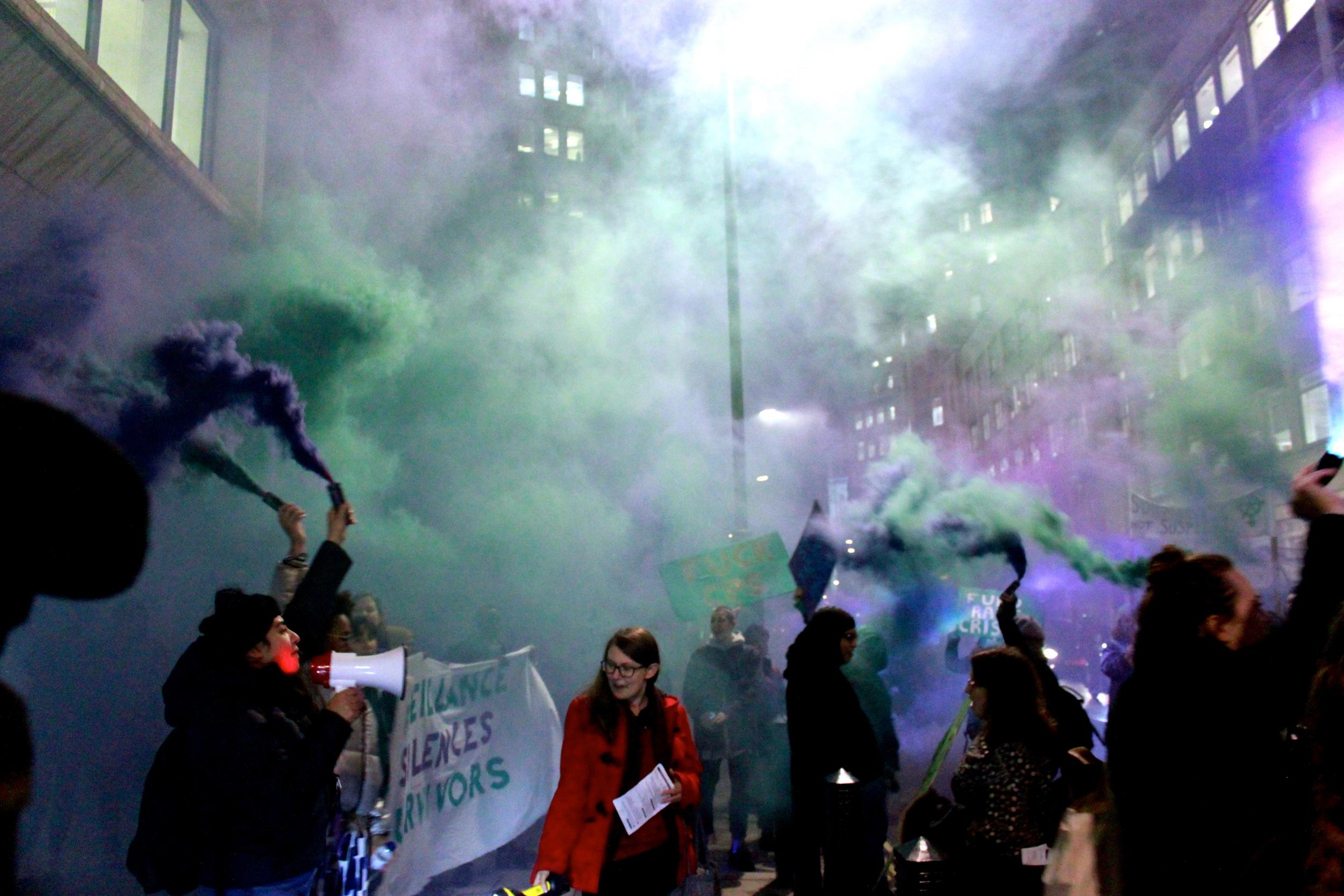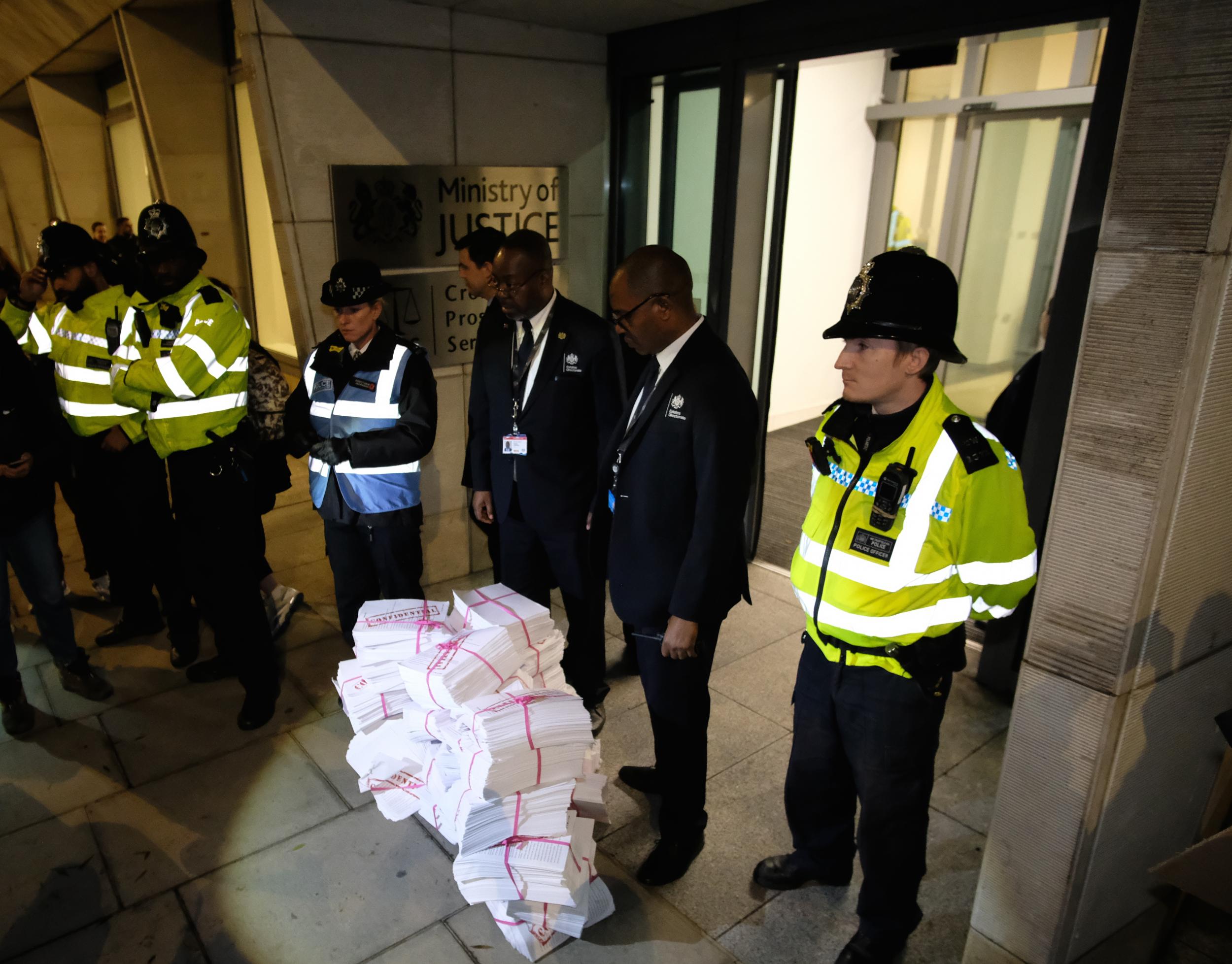Demonstrations against making sex abuse victims hand over sensitive data see CPS headquarters 'evacuated'
'As a survivor of rape, I already felt like the perpetrator had taken so much from me. For the CPS to also take my counselling notes and phone records and share them with him as evidence felt like a whole new violation'

Your support helps us to tell the story
From reproductive rights to climate change to Big Tech, The Independent is on the ground when the story is developing. Whether it's investigating the financials of Elon Musk's pro-Trump PAC or producing our latest documentary, 'The A Word', which shines a light on the American women fighting for reproductive rights, we know how important it is to parse out the facts from the messaging.
At such a critical moment in US history, we need reporters on the ground. Your donation allows us to keep sending journalists to speak to both sides of the story.
The Independent is trusted by Americans across the entire political spectrum. And unlike many other quality news outlets, we choose not to lock Americans out of our reporting and analysis with paywalls. We believe quality journalism should be available to everyone, paid for by those who can afford it.
Your support makes all the difference.Protesters have staged a demonstration at the headquarters of the Crown Prosecution Service (CPS) to vent anger at the way sexual abuse survivors are made to hand over details of personal calls, messages and app data to their abusers.
Sisters Uncut – the feminist direct action group who stormed the Baftas in protest at proposed changes to domestic violence laws – blocked the doors to the CPS offices in London on Thursday night with 30,000 pieces of paper to highlight that an average phone download amounts to 30,000 pages of personal data.
Activists say the CPS policy of frequently demanding the police download data from the mobile phones of sexual violence survivors equates to investigating victims rather than their abusers, to whom the data is then disclosed via their lawyers.
“We had about 100 people there. They evacuated the whole of the CPS building. We definitely caused a bit of disruption,” said Emily Wood, a spokesperson for the group.
“We had some speeches from a survivor who had experienced the immense trauma of having the CPS go through her data. It left her unable to trust any services. She found going through the process of giving birth and accessing services really difficult because of her past experience of having her medical records looked at in court.”
Recent controversy over failed prosecutions has resulted in increasing demands for access to all text messages, calls, social media and app data. Specialists supporting survivors say they are now routinely informed their cases will be dropped unless they agree.

The protesters say the new policy has made the situation much worse for survivors, who already faced having their medical, social services and counselling records scoured through by the police and CPS, handed over to their abusers’ defence teams, and used to undermine them in court.
Recently publicised examples include calls made and texts sent after the assault being used to argue that the victim was not traumatised enough for the assault to have occurred.
“Police have been asking for counselling notes and medical records for a really long time, but phone records is a new thing that only started happening in December 2017,” Ms Wood said.
Some survivors have argued they were left feeling vulnerable due to having such potentially sensitive information disclosed to their perpetrators.
One of the survivors, who took part in the part in the protest but asked not to be named for their protection, said: “As a survivor of rape, I already felt like the perpetrator had taken so much from me. For the CPS to also take my counselling notes and phone records and share them with him as evidence felt like a whole new violation.
“To have them laid out in full in front of a courtroom full of strangers judging you is beyond explanation. A system that puts survivors through that in order to secure a conviction should not be allowed to call itself a justice system.”
Another, who also requested anonymity, said: “It took me almost two years to get to court, then my mental health diagnosis was shared with the defence. I was labelled ‘unreliable’, ‘attention seeking’, ‘promiscuous’, ‘unstable’ and ‘prone to delusions’. Despite CCTV and DNA evidence, he was found not guilty.”
In September, it was revealed that one woman who had reported being abused before mobile phones were in use had her case dropped after she chose not to hand over her current device.
The revelations led London’s victims’ commissioner to say the intrusive gathering of data about possible rape victims is unlawful and risks stopping them coming forward.
Claire Waxman, London’s victims’ commissioner, wrote to the Information Commissioner’s Office saying victims were routinely being told their cases would be dropped unless they signed consent forms.
Sisters Uncut argue “the criminal justice system is unable to provide real justice, safety or support for survivors and that funding is urgently needed for alternatives”.
The protest, which took place on Max Hill QC’s first day in his new role as head of the CPS, called for the money saved from halting the policy of downloading the mobile phones of survivors reporting sexual violence to instead be spent on transformative responses to sexual abuse.
Sue Hemming, director of legal services at the CPS, said: “Sexual offences can have a devastating impact and we work closely with the police to bring offenders to justice and help to support complainants.
“The need to balance a major increase in material with our duty to respect privacy and make sure all reasonable lines on inquiry are pursued is an important challenge.
“We are clear that seeking to examine mobiles of complainants is not something that should be pursued in every case. It is crucial that only reasonable lines of inquiry are pursued, to avoid unnecessary intrusion.
“This week a judgment from the Court of Appeal endorsed CPS guidelines around evidence and reasonable lines of enquiry.”
Sisters Uncut is a direct action group protesting cuts to domestic and sexual violence services who made headlines when storming the red carpet at the 2015 premiere of the film Suffragette. The group was formed by domestic violence survivors and sector workers in 2014 but now has a network of groups across the UK.
Join our commenting forum
Join thought-provoking conversations, follow other Independent readers and see their replies
Comments